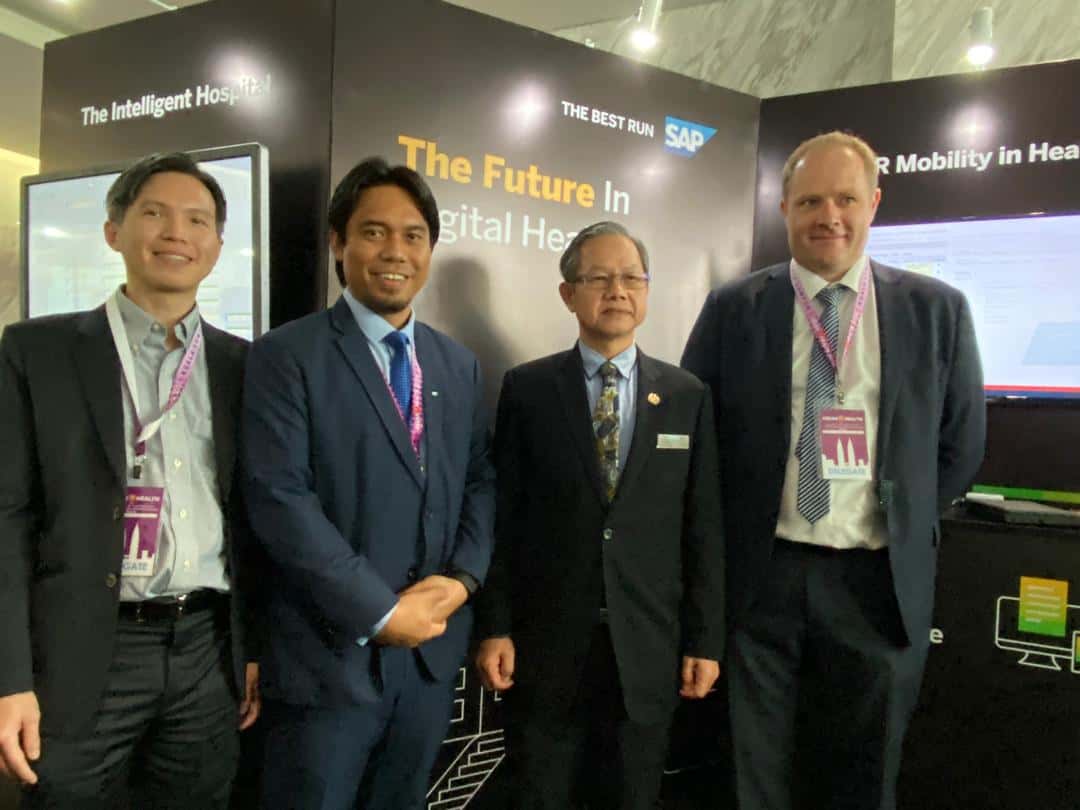Future trends in healthcare will be driven by unprecedented access to Big Data and latest technologies, coupled with greater involvement by patients and healthcare consumers as the industry heads personalised medicine.
SAP Malaysia public services director Hazmin Abdul Rahim (right in pic, in deep discussion with Tan Sri Dr Mohd Munir Abdul Majib) said that digital innovation is already helping the healthcare industry anticipate real-life demand and supply for services, streamline prevention and treatment, while giving patients greater control over their health.
“SAP believes that intelligent technologies will help change the current course of healthcare. It may be possible to have a path that harnesses high tech and achieve healthier outcomes at the enterprise and service line level through the Intelligent Enterprise,” said Hazmin, speaking on the sidelines of the ASEAN Health Summit 2019 entitled “SmartHealth: Embracing Digital Healthcare” organised by the ASEAN Business Advisory Council Malaysia.
“An Intelligent Enterprise uses intelligent technologies, such as Artificial Intelligence (AI), Machine Learning (ML), Internet of Things capabilities (IoT) and real-time, in-memory Analytics to achieve operational and clinical excellence in care delivery. Hospitals are already employing these modern technologies before applying them when they find a quantifiable business value,” explained Hazmin.
For example, to eliminate the use of counterfeit pharmaceutical products into the legitimate supply chain; blockchain technology is being used to ensure the unique identification and verification of individual medicine packages. One such example in Southeast Asia is Zuellig Pharma, one of the largest healthcare services groups in Asia serving more than 350,000 medical facilities across 13 markets.
Zuellig Pharma aim was to make healthcare more accessible by harnessing blockchain technology to address counterfeit medicine, cross-border trading and product recalls. As a result, the company leveraged SAP’s Cloud Platform Integration Suite to facilitate coordination across the healthcare supply chain. As part of its digital transformation, Zuellig Pharma also migrated to SAP HANA on Azure to gain access to broader capabilities including the immediate modernization of multiple apps and real-time data-driven insights.
“Intelligent technologies play a big role on how healthcare can democratise data, generate better operational efficiency, and provide better experience for patient care,” said Hazmin.
“The path to optimum ASEAN healthcare is delivering the Intelligent Enterprise to provide the value-based care and operational efficiency to healthcare providers and improve the overall healthcare experience for patients that will further improve people’s lives.”
More than 7,900 healthcare providers in 94 countries innovate with SAP solutions and 7 out of 10 best hospitals in the world run on SAP solutions.
The ASEAN Health Summit 2019 was launched by deputy health minister Dr Lee Boon Chye (pic – second right), accompanied by Tan Sri Dr Mohd Munir Abdul Majib who is chairman of the ASEAN Business Advisory Council Malaysia, and also chairman of CIMB-ASEAN Research Institute. Tan Sri Dr Munir is also a member of the National Economic Action Council Malaysia.










